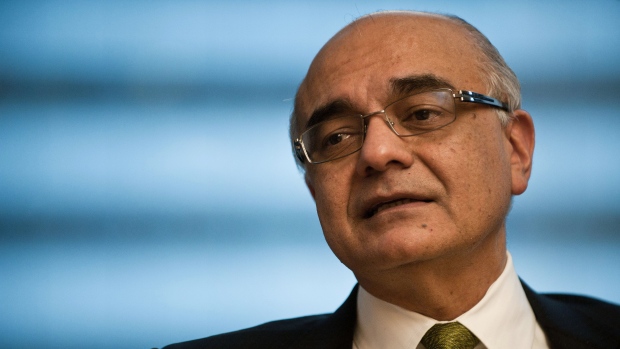May 24, 2018
TD's Masrani says he worries about 'uncertainty' in Canada's outlook

The head of Toronto-Dominion Bank said he worries uncertainty about trade, housing and competitiveness will weigh on Canada’s economic outlook.
“In Canada there is some worry, in a sense, are we at a point in the cycle where things might slow down,” TD CEO Bharat Masrani told BNN Bloomberg in an interview Thursday.
Canada’s second-largest lender reported better-than-expected quarterly earnings Thursday morning. TD saw substantial profit growth from its American operations and was helped by a major U.S. corporate tax cut passed late last year. Those tax cuts are expected to help fuel TD’s U.S. growth, said Masrani.
“I feel good particularly given the tax reform in the U.S. that will provide some more momentum to the economy,” he said.
And while Masrani said he expects U.S. growth to continue, he is not so sure when it comes to Canada.
“Last year was particularly robust form a GDP growth perspective. Our view is it will moderate [to] around two per cent, which for Canada is a good number,” he said.
The future of the North American Free Trade Agreement and the Trans Mountain pipeline dispute continue to cast a shadow over Canada’s outlook, Masrani said.
“My own belief is that at the end of the day we will get a sensible deal on NAFTA [but] in the meantime there is lots of uncertainty and that does drive investment decisions that are not optimal sometimes,” he said. “Within Canada we have our own issues between B.C. and Alberta, which are not helpful.”
Those issues are helping to raise doubts about Canada’s competitiveness, Masrani said. In some “pockets” of the economy, Canada is not competitive, he said.
“The global economy is transforming, are we keeping up with it?” Masrani said. “In certain sectors we may be more competitive [but] in traditional sectors we may not.”
Uncertainty over the Canada’s housing sector is also a concern, he said. New mortgage stress tests and other lending rules have helped to cool hot markets in Toronto and Vancouver, but it’s premature to determine if the markets have returned to balance, said Masrani.
“[It’s] a little early to declare victory or a soft landing,” he said. “We have to give it time.”
TD expects its mortgage lending business growth to remain in the mid-single digit range this year.
“We feel that this market will be more balanced rather than going to the extremes – that’s our expectations,” he said.
As long as Canada’s economy continues to grow and unemployment remains relatively low, Canadian households – and TD – will be able to deal with rising mortgage and consumer debt. But that could change, Masrani said.
“We have a substantial market share in the country, so if things were to go sideways, of course we will take losses,” he said.



